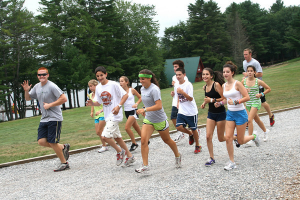 With the Center for Disease Control and Prevention (CDC) reporting that nearly 1 in 5 children between the ages of 6 and 19 is obese, it has become imperative that we, as parents, make as much effort to set our children up for success in establishing proper food habits, just as we would in other areas of their lives. Three primary causes consistently cited for childhood obesity are lack of physical activity, an unbalanced diet and overeating. An often overlooked benefit to summer camp is the significant impact it has in curbing childhood obesity by promoting an active lifestyle and healthy eating practices. In this multi-part series, we will examine the efforts being made by summer camps to battle poor diet and exercise.
With the Center for Disease Control and Prevention (CDC) reporting that nearly 1 in 5 children between the ages of 6 and 19 is obese, it has become imperative that we, as parents, make as much effort to set our children up for success in establishing proper food habits, just as we would in other areas of their lives. Three primary causes consistently cited for childhood obesity are lack of physical activity, an unbalanced diet and overeating. An often overlooked benefit to summer camp is the significant impact it has in curbing childhood obesity by promoting an active lifestyle and healthy eating practices. In this multi-part series, we will examine the efforts being made by summer camps to battle poor diet and exercise.
Part I. Physical Activity
Beyond traditional summer camp sports such as soccer, basketball, baseball, 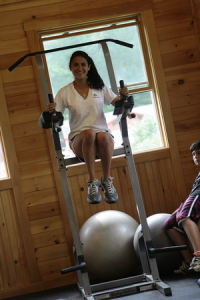 roller hockey and gymnastics, many camps are increasingly focusing on the development of extensive programs for such popular fitness activities as spin, running, weights, zumba, yoga and the martial arts. The instant popularity of these programs suggests that children have a natural interest in exercise and will engage in it of their own accord in the absence of many of the daily distractions that promote a more lethargic lifestyle but are not readily available at summer camp, such as computers, video game systems and television. The ability to participate in fitness programs as a form of fun also encourages campers to approach such activities with an open mind rather than as something forced on them and that is only done out of necessity.
roller hockey and gymnastics, many camps are increasingly focusing on the development of extensive programs for such popular fitness activities as spin, running, weights, zumba, yoga and the martial arts. The instant popularity of these programs suggests that children have a natural interest in exercise and will engage in it of their own accord in the absence of many of the daily distractions that promote a more lethargic lifestyle but are not readily available at summer camp, such as computers, video game systems and television. The ability to participate in fitness programs as a form of fun also encourages campers to approach such activities with an open mind rather than as something forced on them and that is only done out of necessity.
Some camps are also experimenting with nutrition programs that merge cooking and fitness activities. Such programs teach campers how to plan healthy meals and snacks and then prepare them. Cooking programs are among the most popular at summer camp. To merge them with nutrition is a clever way to demonstrate the importance of using discretion in choosing what we eat and consuming it in moderation. In the past, the idea of “diet,” as in depriving oneself of necessary nutrients, has been cited as a contributing factor in the growth of eating disorders and yo-yo dieting.
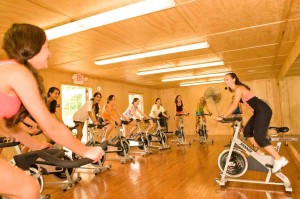
For those who question the lasting effects of fitness and nutritional habits adapted at summer camp, statistics indicate that they won’t be going away anytime soon. According to the American Camp Association, more than half of children who pursue a new interest at camp will continue pursuing that interest once they return home.
Up next, part II. Balancing Nutrition and a Healthy Lifestyle

 570-798-9831
570-798-9831
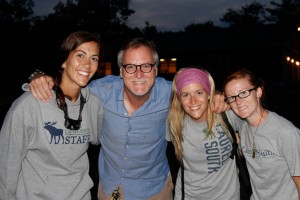
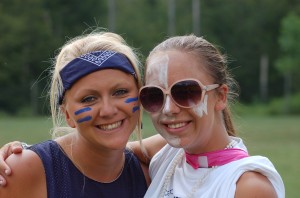
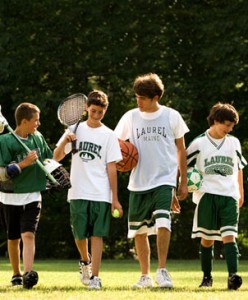
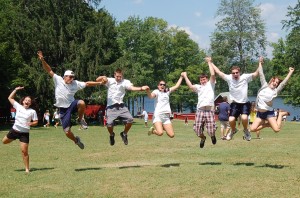
 Our society has long promoted the idea that intelligent people do well on tests and earn good grades. But Howard Gardner, a Professor of Education at Harvard University argues that there are
Our society has long promoted the idea that intelligent people do well on tests and earn good grades. But Howard Gardner, a Professor of Education at Harvard University argues that there are 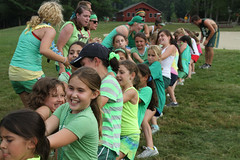 Camp experiences are designed with the whole child in mind and to take things further. Camp helps children develop respect for others, hone personal character, and learn to negotiate and appreciate diverse people. Although this learning should take place all year long, most education systems operate on old models, so summer camp provides
Camp experiences are designed with the whole child in mind and to take things further. Camp helps children develop respect for others, hone personal character, and learn to negotiate and appreciate diverse people. Although this learning should take place all year long, most education systems operate on old models, so summer camp provides 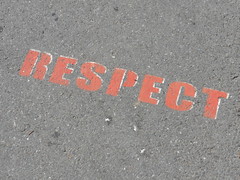


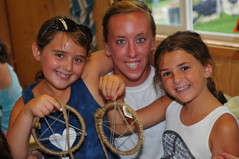


 Moving from one year towards the next has me thinking about summer camp in the past and future.
Moving from one year towards the next has me thinking about summer camp in the past and future. 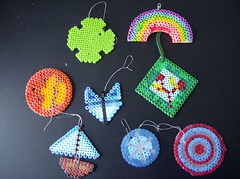 As summer camps have become more inclusive, the world that children experience both in the United States and globally has also become very different. Many children have access to a much broader world through travel, moving images, or other technologies, but some things just haven’t changed. For instance, our pre-college age identities are still informed by interactions with peers and people connected to our individual worlds, directly translating to the people we make direct contact with. While community is still central to human development, many of our daily communities are no longer bound by neighborhood blocks tied to local shared institutions and celebrations. Our families and extended social circles filter across state, nation and even electronic borders.
As summer camps have become more inclusive, the world that children experience both in the United States and globally has also become very different. Many children have access to a much broader world through travel, moving images, or other technologies, but some things just haven’t changed. For instance, our pre-college age identities are still informed by interactions with peers and people connected to our individual worlds, directly translating to the people we make direct contact with. While community is still central to human development, many of our daily communities are no longer bound by neighborhood blocks tied to local shared institutions and celebrations. Our families and extended social circles filter across state, nation and even electronic borders. SO, since children today live in this exciting world of shifting boundaries most months of the year, summer camp is the perfect environment to find time for nurturing our human need to create community. For the past century and through some necessary changes, the basic premise of summer camp has remained the same—camp is a designated, safe space dedicated to fostering and experiencing community life, personal development and skill-building. Each year as improvements are made to camp facilities and other choices, some things don’t change, like living in cabins or bunks, daily activities together, arts and crafts, hikes, water and land sports, singing camp songs and roasting marshmallows around campfires to name a few!
SO, since children today live in this exciting world of shifting boundaries most months of the year, summer camp is the perfect environment to find time for nurturing our human need to create community. For the past century and through some necessary changes, the basic premise of summer camp has remained the same—camp is a designated, safe space dedicated to fostering and experiencing community life, personal development and skill-building. Each year as improvements are made to camp facilities and other choices, some things don’t change, like living in cabins or bunks, daily activities together, arts and crafts, hikes, water and land sports, singing camp songs and roasting marshmallows around campfires to name a few!  Past, present and future campers are all part of a lively and creative shared community where remembering a song, a person, an event, a skit, food or a poignant moment can instantly transport peers back to camp. So, what you would add to a time capsule to “capture” the timeless spirit of camp and why? We’d love to hear what alumni and present campers would include in an electronic time capsule, so get scanning or writing up those memories and lessons learned! If you’re not sure how to get started, ask questions in the comments below!
Past, present and future campers are all part of a lively and creative shared community where remembering a song, a person, an event, a skit, food or a poignant moment can instantly transport peers back to camp. So, what you would add to a time capsule to “capture” the timeless spirit of camp and why? We’d love to hear what alumni and present campers would include in an electronic time capsule, so get scanning or writing up those memories and lessons learned! If you’re not sure how to get started, ask questions in the comments below!



 As we all know, time passes and our camp years are limited by the fact that we’re only children once. It’s easy to feel briefly melancholy at year’s end as time waits for no one, but of course, December also means that the promise of a new year is around the corner! In January, we’d like to continue looking backwards and forwards while thinking about camp and we’d especially love to hear from camp alumni. What’s the funniest thing that happened to you at camp? How did camp contribute to your adult life? We’d like to hear about the memories you hold dear and close to your heart, or what you wish for campers next year? If you’re counting the days until camp starts, what are YOU planning?
As we all know, time passes and our camp years are limited by the fact that we’re only children once. It’s easy to feel briefly melancholy at year’s end as time waits for no one, but of course, December also means that the promise of a new year is around the corner! In January, we’d like to continue looking backwards and forwards while thinking about camp and we’d especially love to hear from camp alumni. What’s the funniest thing that happened to you at camp? How did camp contribute to your adult life? We’d like to hear about the memories you hold dear and close to your heart, or what you wish for campers next year? If you’re counting the days until camp starts, what are YOU planning?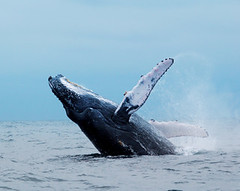 Have you ever heard of
Have you ever heard of 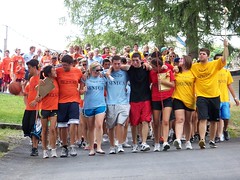 With the help of the US Navy and a local boat owner, Dr. Bernie Krause started sending out whale calls through the water. (If you’ve not heard them, they are
With the help of the US Navy and a local boat owner, Dr. Bernie Krause started sending out whale calls through the water. (If you’ve not heard them, they are  What do camp counselors learn at camp that helps them later in life? The specific answers to that question are varied, but one thing remains constant—camp has a big impact on individual lives long after campers grow out of their camping and counselor years. Recently
What do camp counselors learn at camp that helps them later in life? The specific answers to that question are varied, but one thing remains constant—camp has a big impact on individual lives long after campers grow out of their camping and counselor years. Recently  One counselor puts it this way, “Many aspects of camp allowed counselors to forget life outside of camp and just live in the present focusing on how to facilitate fun in the moment. I don’t think you get to do that as frequently in other life experiences, or at least you are not encouraged to do it as frequently.” She goes on to state that these skills are important in any profession and that camp administrators also served as
One counselor puts it this way, “Many aspects of camp allowed counselors to forget life outside of camp and just live in the present focusing on how to facilitate fun in the moment. I don’t think you get to do that as frequently in other life experiences, or at least you are not encouraged to do it as frequently.” She goes on to state that these skills are important in any profession and that camp administrators also served as 
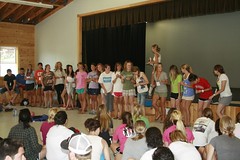
 According to American Camp Association
According to American Camp Association Smith says that summer camp provides a unique learning experience for college students since “a camp job offers real life experiences and a hands-on education that simply cannot be found in a classroom.” If you’re looking for a way to earn money and also develop and grow as a person, summer camp is a place where children and adults come together to form a unique community. It’s
Smith says that summer camp provides a unique learning experience for college students since “a camp job offers real life experiences and a hands-on education that simply cannot be found in a classroom.” If you’re looking for a way to earn money and also develop and grow as a person, summer camp is a place where children and adults come together to form a unique community. It’s